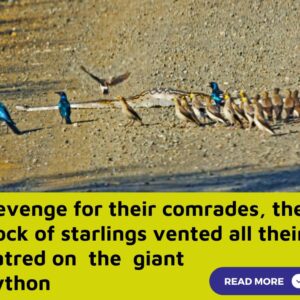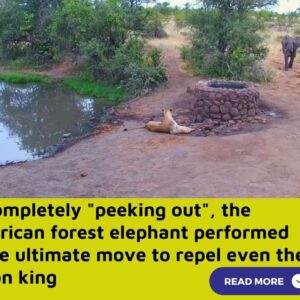Each year Din Din spends approximately eight months with Joao and is believed to spend the rest of the time breeding off the coast of Argentina and Chile.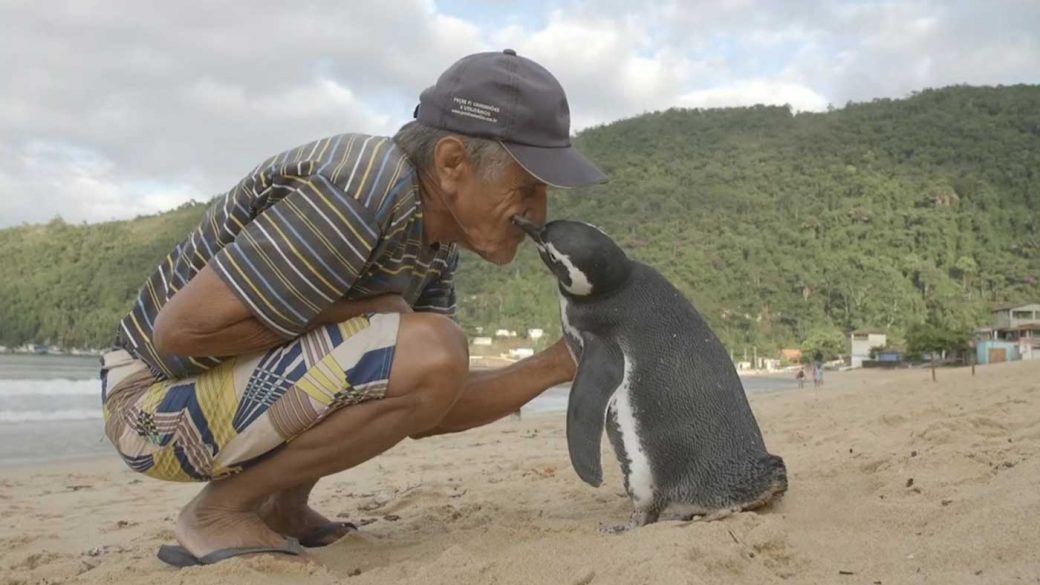
This has got to be one of the most heartwarming wildlife stories we’ve ever published on ADAPT.
This little South American Magellanic penguin swims 5,000 miles, to a beach in Brazil, every year in order to be reunited with the man who saved its life. It sounds like something out of a fairytale, but it’s true!
71-year-old retired bricklayer and part-time fisherman Joao Pereira de Souza, who lives in an island village just outside Rio de Janeiro, Brazil, found the small Magellanic penguin lying on rocks at his local beach in 2011.

The penguin was covered in oil and running out of time fast. Joao rescued the penguin, naming it Din Din, cleaned the oil off its feathers and fed him a daily diet of fish to rebuild its strength.
After a week of rehabilitation, Joao attempted to release the penguin back into the wild. However, Din Din had already formed a family bond with his rescuer and wouldn’t leave.
“He stayed with me for 11 months and then, just after he changed his coat with new feathers, he disappeared,” Joao recalls.
The little guy wasn’t gone long though and just a few months later, he was back at the same beach. He spotted Joao fishing and followed him home, staying with him for the rest of the year.
Amazingly, this cycle has continued over the past five years; each year Din Din spends approximately eight months with Joao and is believed to spend the rest of the time breeding on the Patagonia coasts of Argentina and Chile.
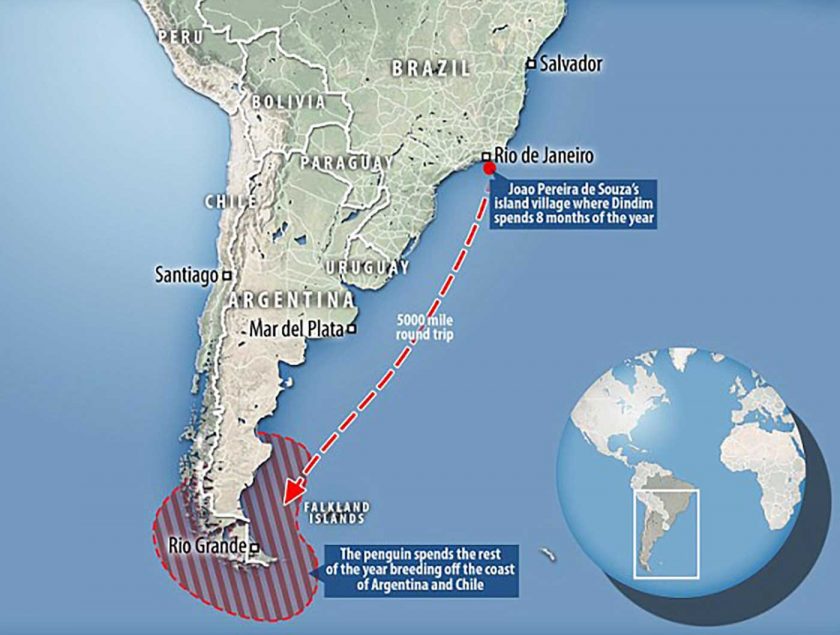 It’s thought that Din Din swims up to 5,000 miles between the Patagonia coasts of Argentina and Chile and Rio de Janeiro. Image: University of Rio de Janeiro
It’s thought that Din Din swims up to 5,000 miles between the Patagonia coasts of Argentina and Chile and Rio de Janeiro. Image: University of Rio de Janeiro
“I love the penguin like it’s my own child and I believe the penguin loves me,” Joao told Globo TV. “No one else is allowed to touch him. He pecks them if they do. He lays on my lap, lets me give him showers, allows me to feed him sardines and to pick him up.
“Everyone said he wouldn’t return but he has been coming back to visit me for the past five years. He arrives in June and leaves to go home in February and every year he becomes more affectionate as he appears even happier to see me.”
Professor Krajewski, a biologist who interviewed the fisherman for Globo TV, told The Independent: “I have never seen anything like this before. I think the penguin believes Joao is part of his family and probably a penguin as well. When he sees him he wags his tail like a dog and honks with delight.”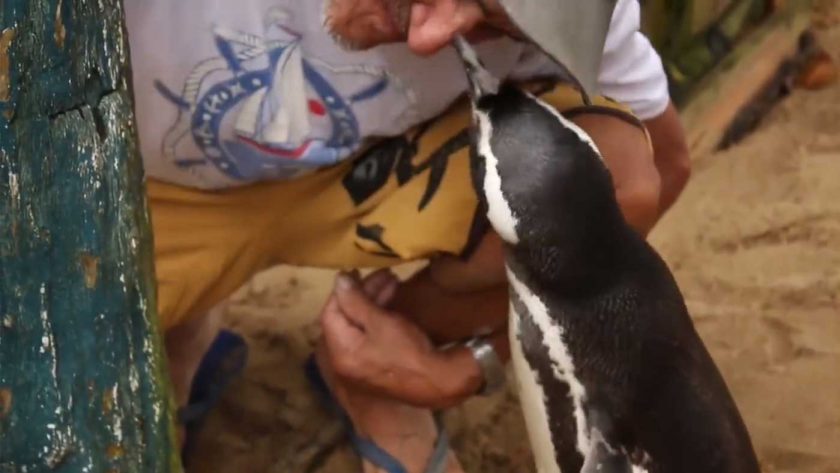 Din Din has formed a family bond with Joao. Photo: University of Rio de Janeiro
Din Din has formed a family bond with Joao. Photo: University of Rio de Janeiro
Penguins live for about 25 years and are known for their loyalty to their mates, staying with the same partner until they die.
However, environmentalists warn that, while hundreds of the Magellanic species are known to naturally migrate thousands of miles north in search of food, there has been a worrying rise in the phenomenon of oceanic creatures washing up on Brazil’s beaches.

Professor David Zee, an oceanographer from Rio de Janeiro’s State University, said the increase is due in part to global climatic changes.
He explained: “Every year the strong ocean currents from the Falkland region traps and brings many species of seals, whales, dolphins, turtles and penguins to the Brazilian coast. This is becoming more problematic due to environmental changes and the increasing frequency of el Niño, in which the Pacific Ocean is warming up for prolonged periods of time.
“The marine creatures get confused and lost as they are dragged away on the surf from their normal habitat and end up in areas where they are unable to survive.”
Professor Zee added sea animals face “increased danger with the ongoing contamination of the oceans with oil and other derivatives” spilt by oil tankers.
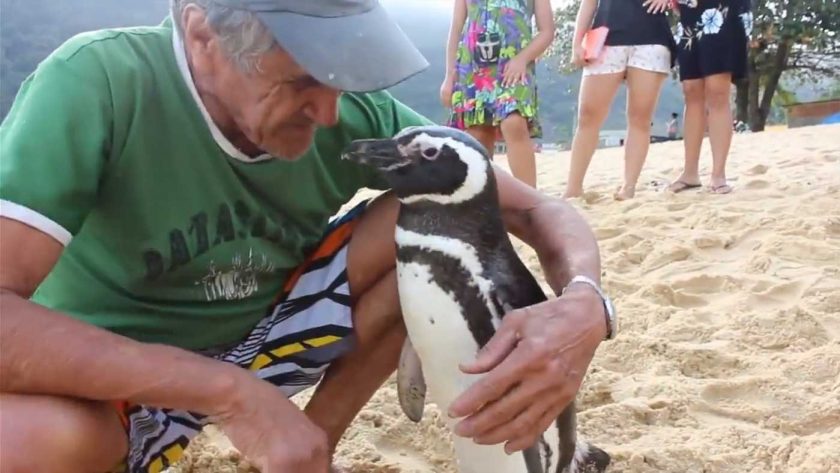 Joao with Din Din. Photo: University of Rio de Janeiro
Joao with Din Din. Photo: University of Rio de Janeiro
Luckily the ending for Joao and Din Din has been a happy one, even though it is illegal in Brazil to keep wild animals as pets.
Professor Krajewski said: “Professionals who work with animals try to avoid relationships like this occurring so they are able to reintroduce the animal into the wild. But in this isolated case the authorities allowed Din Din to stay with Joao because of his kindness.”
Inspire others by sharing this amazing story and let us know your thoughts in the comments below.
Featured image: Globo TV



